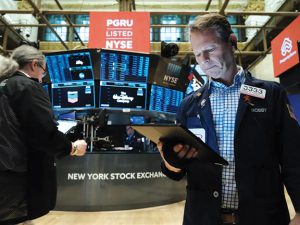Bloomberg
US equity futures fall on Monday, while Treasury yields rise, as a jump in energy costs highlighted inflation concerns and cracks in China’s Covid-19-afflicted economy dimmed the growth outlook.
US index futures followed a decline in Asia-Pacific stocks, which were sapped by Japan and China. Markets in Australia, Hong Kong and much of Europe remain shut for Easter.
Treasuries declined as investors look forward to speeches by Federal Reserve policy makers this week for new clues on whether it will raise interest rates by a half point in May to curb price pressures. A cautious overall investor mood bolstered the dollar and gold.
Natural gas advanced and oil held gains, partly on risks from Russia’s war in Ukraine. These include the possibility of a de facto European Union embargo on Russian gas and the threat of some curbs on crude in the next European sanctions.
The pattern across markets suggests investors remain uncertain whether high inflation has peaked or not. Price pressures are being fanned by supply-chain snarls from China’s Covid-19 restrictions and disruptions to commodity flows due to the war. Concern is growing that the US economy faces a downturn as the Fed pivots toward aggressive policy tightening to contain the cost of living.
“Major regime change is rarely smooth in either geopolitics or economics, and markets are under-pricing these risks,†Eric Robertsen, chief strategist at Standard Chartered Bank Plc, wrote in a note. “We are increasingly concerned about a summer of turbulence and volatility.â€
History suggests the Fed will face a difficult task in tightening policy to cool inflation without causing a US recession, according to Goldman Sachs Group Inc. It put the odds of a contraction at about 35% over the next two years.
The yen fluctuated after Bank of Japan Governor Haruhiko Kuroda described its retreat as very rapid.
In China, economic data were mixed — while first-quarter gross domestic product growth accelerated, retail sales shrank in March for the first time since 2020. The latter hinted at ongoing damage from recent Covid lockdowns.
China cut the reserve requirement ratio on Friday but refrained from lowering interest rates in a cautious approach to policy easing that may sap sentiment.
In Shanghai, officials reported the first deaths from a surging Covid-19 outbreak. The city has also published plans to resume production after a prolonged lockdown, recommending businesses adopt so-called closed-loop management, where workers live on-site and are tested regularly.
 The Gulf Time Newspaper One of the finest business newspapers in the UAE brought to you by our professional writers and editors.
The Gulf Time Newspaper One of the finest business newspapers in the UAE brought to you by our professional writers and editors.
